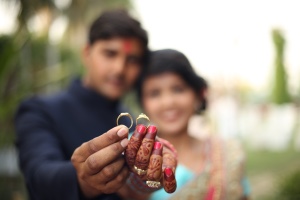
Sunday Snippets
 Venkatesh Raghavan
Venkatesh Raghavan
 The Union cabinet’s decision to increase the marriageable age of girls from 18 to 21 has met with a mixed bag of responses, some interesting, some hilarious and some commendatory. Some youngsters in the final years of college welcomed the move, there were others who had planned to tie the knot at the earliest expressing a jilted feeling.
The Union cabinet’s decision to increase the marriageable age of girls from 18 to 21 has met with a mixed bag of responses, some interesting, some hilarious and some commendatory. Some youngsters in the final years of college welcomed the move, there were others who had planned to tie the knot at the earliest expressing a jilted feeling.
In cosmopolitan Mumbai, the move of the cabinet is approved by youngsters cutting across party lines. “We are not BJP [Bharatiya Janata Party] supporters. However, we choose to hail this move as a progressive act and we whole-heartedly support it,” voiced young college going girls Shweta and Alifa.
Alifa added, “In our early years, at times we take a break from studies while pursuing a job before switching back to further studies. It acts like a sabbatical from our working life. With the increase in minimum age, girls like us will find it easier to get into the marriage market despite any age barriers that our society constantly keeps imposing.”
 Teenager Deepali had a slightly different take on it. “The age factor poses problems for only those households who are in the traditional mode, seeking to marry off their daughters at the earliest. Besides, even in such instances, for a girl who is content to marry a boy of her parent’s consent it will pose no problems. Only in case the girl is in love with the boy of the same age, while her parents are in a hurry to marry her off as soon as she reaches 18, there is some ground for friction. As society becomes increasingly progressive and women get more freedom, this move will go a long way in enhancing the statistics in favour of a higher number of women graduates and post graduates.”
Teenager Deepali had a slightly different take on it. “The age factor poses problems for only those households who are in the traditional mode, seeking to marry off their daughters at the earliest. Besides, even in such instances, for a girl who is content to marry a boy of her parent’s consent it will pose no problems. Only in case the girl is in love with the boy of the same age, while her parents are in a hurry to marry her off as soon as she reaches 18, there is some ground for friction. As society becomes increasingly progressive and women get more freedom, this move will go a long way in enhancing the statistics in favour of a higher number of women graduates and post graduates.”
A mixed group of boys and girls from a south Mumbai college welcomed the Union Cabinet’s proposal as a move in the right direction and hailed it saying, “We young people deserve more freedom in handling our lives. We need to be given more time. This is expected to benefit many girls from the rural pockets of India who are forced into marriage before they have a chance to complete their education. The problem being, after marriage, very few families support their daughter-in-law to complete her education. In some instances, where the girl crosses post-graduation, traditional rural households reject her marriage offers.”
 It actually depends on which side of the fence the boys were sitting. A final year Arts student by name Mihir said, “It’s good that young people get bestowed with more time for dating and choosing their life partner. Also the risk of losing out on your girlfriend, if she happens to be of the same age, before the boy reaches 21 is minimized.”
It actually depends on which side of the fence the boys were sitting. A final year Arts student by name Mihir said, “It’s good that young people get bestowed with more time for dating and choosing their life partner. Also the risk of losing out on your girlfriend, if she happens to be of the same age, before the boy reaches 21 is minimized.”
For 23-year-old Sunil, in his first job however, it meant a longer waiting period. “I had planned to get married with Anita soon next year after she crossed 18. Now we will have to wait for three more years. While the move on the face of it is progressive and serves a good cause by ensuring women get their freedom to complete their graduation, it also upsets the apple cart for lovers like us who are under pressure to get married at the earliest from our homes.”
Yet, Shweta indeed had a final say: “Life is changing. Times are changing. Let our eves have more freedom and fun,” she sounded off.




